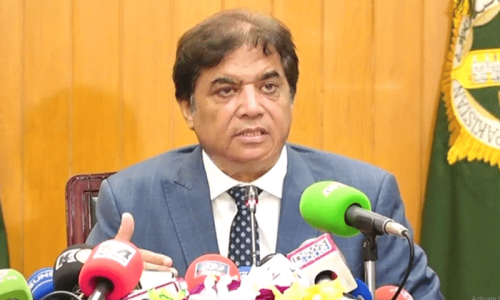ISLAMABAD: In a significant decision, the federal cabinet has given the go-ahead to publish the ‘secretive’ record of gifts received by public office holders from foreign governments and dignitaries.
While the press release issued by the Prime Minister’s Office after the meeting makes no mention of this decision, Defence Minister Khawaja Asif said the record will soon be put up on the Cabinet Division’s website.
“The cabinet has approved the declassification of the Toshakhana record. The record will be posted on the Cabinet Division’s website very soon,” the minister tweeted after the meeting.
Last month, Prime Minister Shehbaz Sharif announced the government’s plans to make the entire record public. He also barred the officials from retaining gifts worth more than $300.
The Toshakhana is the department tasked with storing the gifts received by the prime minister and other high-ranking officials. The efforts to publicise its record have been resisted by successive governments. The previous PTI government said the move could damage national interest and relations with other states.
During Thursday’s meeting, the cabinet also approved Haj Policy, 2023, National Clean Air Policy and an amendment to the National Accountability Ordinance (NAO), according to a statement released by the PMO.
Established in 1978, Toshakhana remained in the limelight over allegations that several rulers took home gifts received from foreign governments. The Election Commission of Pakistan has also disqualified PTI Chairman Imran Khan for not disclosing the gifts in his assets details.
Amendment to NAB law
The amendment to the NAO will give legal cover to cases being transferred away from accountability courts. The amendment will ensure the cases are tried to a conclusion.
The amendment was approved on law ministry’s recommendation to negate the impression that cases being transferred from accountability courts to other courts have been decriminalised.“The amendment would also end the perception that the cases which do not come under the purview of the NAB, were decriminalised,” said the press release.
After last year’s amendments to the NAO, the National Accountability Bureau (NAB) was stopped from investigating cases involving embezzlement of less than Rs500 million. Subsequently, the accountability courts started transferring pending cases that were no longer within the NAB’s ambit.
However, in the absence of an official notification, the relevant forums – FIA or anti-corruption establishment – were reluctant in pursuing those cases due to the lack of legal cover.
A source in the NAB has rebuffed the impression that the chairman of the anti-graft watchdog has been empowered to file and dispose of cases.
The source told Dawn that the NAB chief has been authorised to transfer cases which could not be heard in accountability courts.
This was in reference to the recent amendments empowering the NAB chairman to transfer non-cognisable cases, which could not be tried in accountability courts, to relevant forums.
While approving the Haj policy, the prime minister directed the officials to prepare a comprehensive and effective strategy with Saudi officials to provide the best possible travel and lodging facilities to pilgrims during the Haj.
The cabinet also ratified the decisions made by the Economic Coordination Committee and Cabinet Committee for Legislative Cases during their meetings held on March 1 and March 6.
The Clear Air Policy, prepared by the Ministry of Climate Change was also approved by the cabinet.
Published in Dawn, March 10th, 2023













































